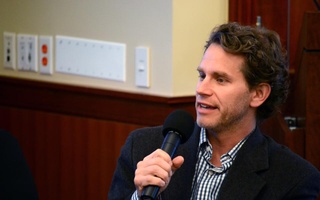In 2001, a research team in Manhattan discovered unexplained levels of polychlorinated biphenyl toxins in samples of human breast milk. To pinpoint the underlying cause, the team needed to find a control group isolated from the pollutants of a heavily industrialized city like New York City. So they packed up and headed to the Canadian Arctic.
Journalist Richard Lister, a British Broadcasting Corporation World Service broadcaster, former State Department reporter, and current affiliate at the Nieman Foundation for Journalism at Harvard, got to go along for the ride.
“The team went to the Arctic thinking these people lived far from factories,” Lister recalls. “But actually, they had five times as many toxins because they were eating fish and ocean mammals that were full of them.”
This insight into the pervasive chain of pollution was one of many turning points that inspired Lister to delve into environmental journalism in the midst of a career that has taken him to over 40 countries and brought him face to face with everything from turmoil in the Balkans and famine in Ethiopia to the O.J. Simpson trial.
Today, Lister is at Harvard with his wife Philippa Thomas, another BBC journalist and a Nieman fellow. The Foundation gives affiliate standing to its fellows’ spouses.
Capitalizing on his affiliate status, Lister has chosen to audit several Earth science and environmental history courses to enrich his understanding of the issues he hopes to cover when he resumes his role as a BBC reporter.
“We’re dealing with either potential catastrophe or potential opportunity, and nobody as yet has found a way to sort out satisfactorily which one it will be—or if it must be both,” he says of the current climate crisis. “I just have the sense that at this moment there’s really no more important issue in terms of its impact on people around the planet.”
COPY TASTING
Immersed in American Studies at the University of Manchester in England, Lister might never have discovered his passion for broadcast journalism if he hadn’t ventured across the pond to Pennsylvania State University for his junior year of college.
At Penn State, he co-hosted a weekly comedy radio show called “Absolutely Live,” working with about 20 peers to write and deliver sketches over the undergraduate airwaves.
“I suppose I enjoyed the creative energy of it, working with a group of like-minded people,” he says. “The instant reaction—being able to talk to a large number of people at once and have them react to what you were doing—was very exciting.”
After college, he ran with his radio momentum and started applying for journalism training courses, largely through the BBC. When he landed a job as a local radio reporter, he was thrown into the world of broadcast journalism full-speed ahead as a “copy taster,” pulling and comparing stories from press agencies.
“You’re expected to do everything—produce, write, cut the tape,” he says. “You get to do an awful lot very quickly.”
But when he joined the BBC World Service radio team—the arm that broadcasts to the rest of the world—he says an even steeper learning curve was in order. Not only were the stories much bigger, involving places “you barely knew existed,” but reporting to international audiences proposes a unique challenge, Lister says.
“It’s relatively easy to report your country’s politics to people who live in your country,” he says. But reporting to the world outside Britain’s borders made him “think more deeply about what the story was and what was important about it.”
Read more in News
Lab Rat Of The Week: Sydney “Alison” KraemerRecommended Articles
-
Nieman Fellow Wins International AwardHollman Morris Rincon, a Colombian journalist and Nieman Fellow who was initially denied a visa this summer to study in the United States, was recently awarded the 2011 Nuremberg International Human Rights Award for his coverage of human rights violations in Colombia.
-
Somali Journalist Recognized for Brave CoverageMohamed Olad Hassan, a Somali journalist who has covered the people of his nation amid dangerous insurgency over the last ...
-
(Not) Eating at HarvardWhile Harvard offers a number of resources for students with eating disorders, eating disorders are often stigmatized and can slip under the radar.
-
Twenty Four Nieman Fellows AnnouncedTwenty-four journalists who work in media ranging from newspapers and magazines to radio and television have been chosen for the 2011-2012 class of Nieman Fellows, the Nieman Foundation for Journalism at Harvard announced on Tuesday.
-
 An Interview with Nieman Fellow Jen B. McDonald
An Interview with Nieman Fellow Jen B. McDonald -
 Journalists Discuss Impact of Social Media on Recent Coverage
Journalists Discuss Impact of Social Media on Recent Coverage













